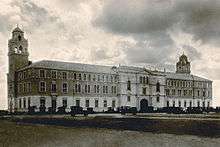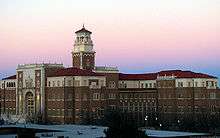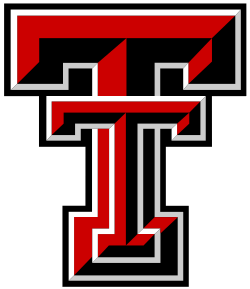History of Texas Tech University

The history of Texas Tech University dates back to the early 1880s, but the university was not established until 1923.
Establishment
The call to open a college in West Texas began shortly after the arrival of settlers in the area in the 1880s.[1][2] In 1917, the Texas legislature passed a bill creating a branch of Texas A&M to be located in Abilene.[3] However, the bill was repealed two years later during the next session after it was discovered that Governor James E. Ferguson had falsely reported the site committee's choice of location. After new legislation passed in the state house and senate in 1921, Governor Pat Neff vetoed it, citing hard financial times in West Texas. Furious about Neff's veto, some in West Texas went so far as to recommend that West Texas secede from the state.[4]
In 1923, the legislature decided that, rather than a branch campus, an entirely new university would better serve the needs of the region.[5] On February 10, 1923, Neff signed the legislation creating Texas Technological College, and in July of that year a committee began searching for a site.[4] When the members of the committee visited Lubbock, they were overwhelmed to find residents lining the streets to show support for the idea of hosting the institution.[6][7] That August, Lubbock was chosen on the first ballot over other area towns, including Floydada, Plainview, and Sweetwater.[6]
Early years

Construction of the college campus began on November 1, 1924.[2] Ten days later, the cornerstone of the Administration Building was laid in front of a crowd of twenty thousand people. Governor Pat Neff, Amon G. Carter, Reverend E. E. Robinson, Colonel Ernest O. Thompson, and Representative R. M. Chitwood spoke at the event.[8] With an enrollment of 914 students—both men and women—Texas Technological College opened for classes on October 1, 1925.[9][10][11] It was originally composed of four schools—Agriculture, Engineering, Home Economics, and Liberal Arts.[5]
During the 1926 football season, head football coach, E. Y. Freeland, and assistant coach, Grady Higginbotham unveiled the first version of the Double T logo.[12] It was first used on the football players sweaters for the inaugural season.[13][14]
Texas Tech grew slowly in the early years. Military training was conducted at the college as early as 1925, but formal Reserve Officers' Training Corps training did not commence until 1936. By 1939, the school's enrollment had grown to 3,890. Though enrollment declined during World War II, Texas Tech trained 4,747 men in its armed forces training detachments.[5] Following the war, in 1946, the college saw its enrollment leap to 5,366 from a low of 1,696 in 1943.[15]
Expansion and growth
By the 1960s, the school had expanded its offerings to more than just technical subjects.[16] The Faculty Advisory Committee suggested changing the name to "Texas State University", feeling the phrase "Technological College" was insufficient to define the scope of the institution.[17] While most students supported this change, the Board of Directors and many alumni, wanting to preserve the Double T logo, opposed it.[18] Other names—University of the Southwest, Texas Technological College and State University,[19] and The Texas University of Art, Science and Technology—were considered,[20] but the Board of Directors chose Texas Tech University, submitting it to the state legislature in 1964. A failed move by Governor John Connally to have the school placed into the Texas A&M University System, as well as continued disagreement and heated debate regarding the school's new name, kept the name change from being approved.[16][17] In spite of objections by many students and faculty, the Board of Directors again submitted the change in 1969. It finally received the legislature's approval on June 6 and the name Texas Tech University went into effect that September.[20] All of the institution's schools, except Law, became colleges.[5][21]
The university was integrated in 1961 when three African-American students were admitted. After its initial rejection of the students' enrollment and the threat of a subsequent lawsuit, the university enacted a policy to admit "all qualified applicants regardless of color".[22] The university offered its first athletic scholarship to a black student in 1967, when Danny Hardaway was recruited to play for the Red Raiders football team.[23] In 1970, Hortense W. Dixon became the first African-American student to earn a doctorate from the university.[24]
In the 1960s and 1970s, the university invested US$150 million in the campus to construct buildings for the library, foreign languages, social sciences, communications, philosophy, electrical and petroleum engineering, art, and architecture. Some other buildings were significantly expanded.[25] On May 29, 1969, the 61st Texas Legislature created the Texas Tech University School of Medicine.[26] The Texas Legislature expanded the medical school charter in 1979, creating the Texas Tech University Health Sciences Center. TTUHSC, which is now part of the Texas Tech University System, includes Schools of Allied Health Sciences, Medicine, Nursing, Pharmacy, and the Graduate School of Biomedical Sciences. It has locations in four Texas cities in addition to the main campus in Lubbock.[27]
Recent history

In 1996, the Texas Tech Board of Regents created the Texas Tech University System. John Montford was selected as the first chancellor to lead the combined academic enterprise.[28] Regents Chair Edward Whitacre, Jr., stated that the move was made due to the size and complexity of the institution. "It's time", he said, "to take the university into the 21st century..."[25] The Texas Tech University system originally included Texas Tech University and Texas Tech University Health Sciences Center. On November 6, 2007, the Texas Legislature ratified an amendment to the Texas Constitution re-aligning Angelo State University with the Texas Tech University System.[29] Kent Hance, a former United States Congressman and Texas Tech University graduate, assumed the duties of chancellor on December 1, 2006.[30]
Even though growth continued at Texas Tech, the university was not immune to controversy. In 2003, a third-year student at the Texas Tech School of Law filed suit against the university over its policy on free speech zones, which restricted student speech to a single "free speech gazebo".[31] The following year, a federal judge declared the policy unconstitutional.[31][32][33]
To meet the demands of its increased enrollment and expanding research, the university has invested more than $548 million in new construction since 2000. It has also received more than $65.9 million in private donations.[25] In April 2009, the Texas House of Representatives passed a bill that will increase state funding for seven public universities. Texas Tech University is classified by the state as an "Emerging Research University" and is among the universities that will receive additional state funding for advancement toward "Tier 1" status. Three funds—the Research University Development Fund, the Texas Research Incentive Program, and the National Research University Benchmark Fund—have been established and will provide $500 million in grants and matching funds during fiscal years 2010 and 2011.[34] On September 2, 2009, the university announced that it had received private gifts totaling $24.3 million. Of these, $21.5 million are eligible for match under the Texas Research Incentive Program.[35] With the 2012 resignation of Guy Bailey as president to assume the presidency of his alma mater University of Alabama, Texas Tech immediately set about to select Bailey's successor.[36]
References and notes
- ↑ Hensley, Doug (2008-08-03). "Landing Tech may have been biggest step in Lubbock's first 100 years". Lubbock Avalanche-Journal. Retrieved 2008-08-04.
- 1 2 "A History of Legendary Lubbock: The Hub City of West Texas" (PDF). Lubbock Chamber of Commerce. p. 9. Archived from the original (PDF) on 2007-10-25. Retrieved 2008-08-08.
- ↑ Mares, Lluvia (2006-01-27). "Abilene home to three distinguished colleges". Abilene Reporter-News. Retrieved 2008-08-06.
- 1 2 "Tech History". Texas Tech University. Archived from the original on 2008-05-26. Retrieved 2008-08-06.
- 1 2 3 4 "Handbook of Texas Online: Texas Tech University". Texas State Historical Association. Retrieved 2008-03-28.
- 1 2 "Texas Tech a Major Part of Hub City History". KCBD. 2008-07-02. Retrieved 2008-07-31.
- ↑ Reynolds, John. "Three universities power higher education in Lubbock". Lubbock Avalanche-Journal. Retrieved 2008-08-06.
- ↑ "Texas Tech University Archives". Southwest Collection. Retrieved 2008-08-20.
- ↑ "College of Arts and Sciences". Texas Tech University System. Archived from the original on 2007-08-15. Retrieved 2008-08-09.
- ↑ Arenas, Jesus (2001-06-23). "Joining of communities led to Lubbock". Lubbock Avalanche-Journal. Retrieved 2008-08-09.
- ↑ Barrick, Nolan (1985). Texas Tech... The Unobserved Heritage. Lubbock, Texas: Texas Tech University Press. p. 38. ISBN 0-89672-125-6.
- ↑ "Origin of the Double T" (PDF). Texas Tech University. Retrieved 2009-10-16.
- ↑ "Make Mine a Double T". Texas Tech University. Retrieved 2009-10-16.
- ↑ "Double T Symbol". Texas Tech University. Retrieved 2008-08-19.
- ↑ "Raw Enrollment Data". Texas Tech University. Retrieved 2008-08-22.
- 1 2 Clark, Robert (January–February 1990). "The Name Change Controversy" (PDF). Southwest Collection. Retrieved 2008-07-31.
- 1 2 Siegrist, Nikki (2003-03-03). "Tech Traditions: Fighting for Change". The Daily Toreador. Retrieved 2008-08-09.
- ↑ "About Us: History". Texas Tech Alumni Association. Retrieved 2008-08-10.
- ↑ Hensley, Doug. "Triumph, tragedy in world's spotlight". Lubbock Avalanche-Journal. Retrieved 2008-08-10.
- 1 2 Elizabeth Langton. "Tech began playing name-change game in '50s". Lubbock Avalanche-Journal. Archived from the original on 2002-01-23. Retrieved 2008-08-10.
- ↑ "General Information". Texas Tech University Office of Official Publications. Retrieved 2008-08-12.
- ↑ Shabazz, Amilcar (2004). Advancing Democracy: African Americans and the Struggle for Access and Equity in Higher Education in Texas. Greensboro, NC: University of North Carolina Press. p. 205. ISBN 978-0-8078-5505-8.
- ↑ Scott, Sam (1999-02-07). "Hardaway relates Tech experience". Lubbock Avalanche-Journal. Retrieved 2008-08-27.
- ↑ "Texas Tech University Archives: Graduation Milestones". Southwest Collection. Retrieved 2008-08-27.
- 1 2 3 "Welcome to Texas Tech". Texas Tech University System. Archived from the original on 2007-12-20. Retrieved 2008-08-20.
- ↑ "Texas Tech University Archives: Medical School". Southwest Collection. Retrieved 2008-08-16.
- ↑ "Profile: Texas Tech University Health Sciences Center" (PDF). Texas Higher Education Coordinating Board. Retrieved 2008-08-16.
- ↑ "Perry suggests Montford for UT System chancellor". KCEN-TV. 2008-04-23. Retrieved 2008-08-15.
- ↑ "Bill: HB 3564". The State of Texas. Retrieved 2008-08-13.
- ↑ "Kent Hance Officially Named Chancellor of the Texas Tech University System". Texas Tech University System. Retrieved 2008-08-15.
- 1 2 ""Speech zones" and "speech code" struck down at Texas Tech University". Alliance Defense Fund. Retrieved 2008-08-22.
- ↑ Hall, Delany (2003-06-13). "Law student sues Texas Tech over free speech zones: Plaintiff claims First Amendment rights were violated by university". The Daily Texan. Retrieved 2008-08-22.
- ↑ Hervey, Christine (2008-04-29). "A look at the Free Speech Zone: Zone offers a default location to express sometimes unpopular ideas". The Del Mar College Foghorn. Retrieved 2008-08-22.
- ↑ "Texas House OKs plan to boost more state universities to 'top tier'". The Dallas Morning News. 2009-04-25. Retrieved 2009-04-26.
- ↑ Post, Sally (2009-09-02). "Texas Tech Announces TRIP Funds". Texas Tech University. Retrieved 2009-09-03.
- ↑ "Bailey did well as Tech president, will be missed on trek to tier one (editorial)". Lubbock Avalanche-Journal. 2012-07-08. p. A12. Retrieved 2012-07-13.
